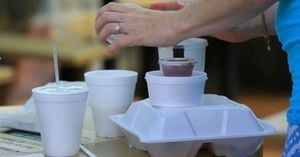Sábado de Gloria, also known as Holy Saturday, is a significant day in the 2025 Holy Week, celebrated on April 19 in Mexico. This day marks a moment of reflection between Good Friday, which commemorates the crucifixion of Jesus, and Easter Sunday, which celebrates his resurrection. In Catholic tradition, Sábado de Gloria is a time of liturgical silence, with no masses until the Easter Vigil, where the faithful meditate on Jesus' sacrifice in the tomb and anticipate the joy of Easter. However, in Mexico, the practice of getting wet with water on this day has become popular, generating controversy due to concerns over water wastage.
So, why do people get wet on Sábado de Gloria? The custom of getting wet on this day is a popular tradition in Mexico and some Latin American countries, although it is not directly linked to official Christian liturgy and has, in fact, been discouraged by the Catholic Church. In medieval Europe, the Church prohibited certain worldly activities, such as bathing, during Holy Week, considering it a time of penance. Thus, Holy Saturday marked the end of these restrictions, and people would bathe to celebrate the arrival of Easter. In Mexico, this custom evolved into a playful practice of throwing water, especially in rural communities where water access was limited. The tradition of getting wet on Sábado de Gloria became popular in the 20th century, particularly in urban areas, where children and young people would take to the streets with buckets, water balloons, or hoses to drench each other, turning it into a festive game.
However, the Catholic Church in Mexico has discouraged this practice, arguing that it trivializes the sacred nature of Holy Saturday and promotes the waste of water, a scarce resource in many regions. Mexican bishops have issued statements urging the public to refrain from soaking others, emphasizing that the day should be one of reflection. In some states, such as Mexico City, sanctions have been implemented for wasting water on Sábado de Gloria, with fines that can reach up to 2,000 pesos or arrests of up to 36 hours, according to the Law of Civic Culture.
Specifically, in Mexico City, wasting water during Sábado de Gloria is strictly regulated by the Water System (Sacmex), the Civic Culture Law, and the Law of Access, Disposal, and Sanitation of Water. Sanctions include fines ranging from 100 to 300 Units of Measurement and Updating (UMA), equivalent to between 11,314 and 33,942 pesos in 2025; administrative arrest of 13 to 24 hours; or community service of 6 to 12 hours. These measures are intensified during Holy Week to promote responsible water use, especially in the context of scarcity in various regions of Mexico.
In the State of Mexico (Edomex), sanctions for wasting water vary by municipality, as each sets its own regulations. For instance, in Ecatepec, fines can reach 11,314 pesos, and authorities may impose community service of 6 to 12 hours. Sábado de Gloria 2025 is an opportunity to reflect on its religious significance and enjoy Mexican traditions responsibly. Instead of getting wet, consider participating in the Easter Vigil.
Another significant aspect of Sábado de Gloria is the tradition known as 'Quema de Judas' (Burning of Judas), celebrated throughout Mexico on this day. This ritual involves burning representations of Judas Iscariot, who betrayed Jesus Christ for 30 pieces of silver. The act serves as a symbolic reminder of Judas's betrayal and is often accompanied by the burning of effigies representing politicians or other unpopular figures.
In this tradition, faithful individuals spend hours or even days creating an image of Judas to burn on Sábado de Gloria in front of other believers. This practice occurs in various locations across Mexico, from urban centers like Mexico City to rural towns. The expectation is that thousands of Judas figures will be burned throughout the country on this Holy Saturday, marking one of the last celebrations before Easter Sunday, when Jesus is said to have risen, according to the scriptures.
While the 'Quema de Judas' is a long-standing tradition, it is essential to note that it reflects a broader cultural context. The act of burning Judas not only serves as a reminder of the biblical narrative but also allows communities to express their frustrations with contemporary figures, making it a relevant and dynamic tradition.
Despite the joy associated with these celebrations, the ongoing water crisis in Mexico has transformed the nature of Sábado de Gloria. Authorities are now focused on preventing water wastage, which has become a significant concern in a country where water scarcity is increasingly prevalent. The National Water Commission (Conagua) has warned about critically low levels in dams and water sources, suggesting that the future may require formal rationing.
In light of these developments, the authorities are calling for collective awareness. What was once a playful tradition is now perceived as a violation of responsible resource use. The transformation of Sábado de Gloria illustrates that the water crisis is reaching a critical point, and popular customs must adapt not only to legal requirements but also to the increasingly dry reality of the country.
As Mexico approaches Sábado de Gloria 2025, the interplay between tradition and modern challenges becomes evident. The celebration, rich in cultural significance, must navigate the realities of resource management while honoring the historical and spiritual dimensions that define this important day in the Mexican calendar.





